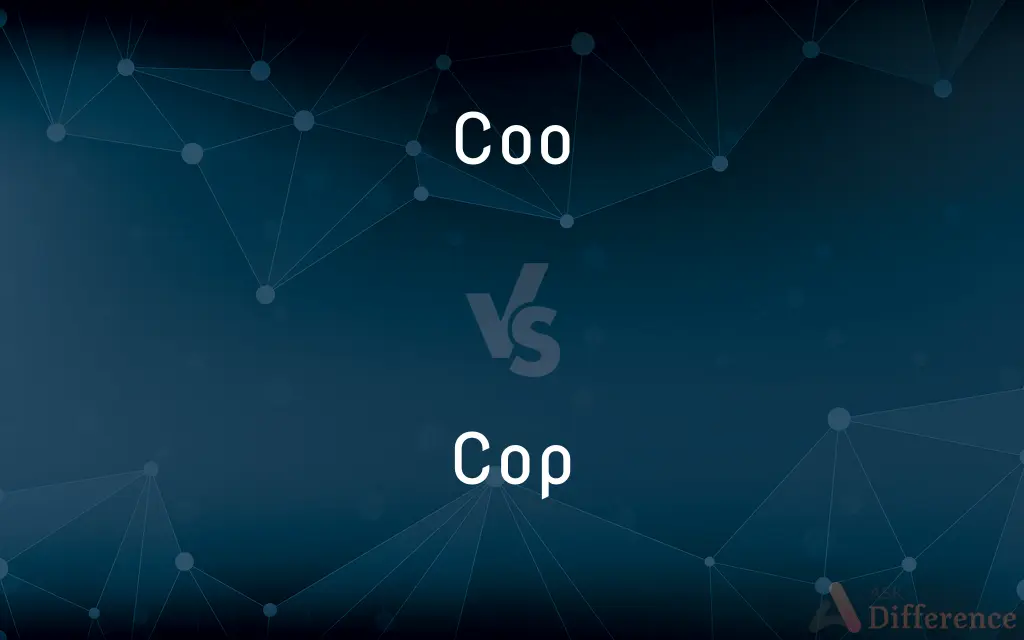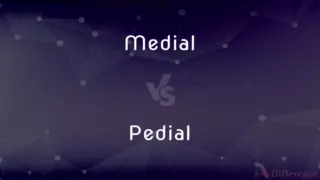Coo vs. Cop — What's the Difference?
By Tayyaba Rehman & Maham Liaqat — Updated on April 9, 2024
Coo refers to the soft, murmuring sound made by pigeons and doves, embodying peace and calm, while cop is a slang term for police officer, indicating authority and law enforcement.

Difference Between Coo and Cop
Table of Contents
ADVERTISEMENT
Key Differences
Cooing is a gentle, soothing sound made by birds, especially pigeons and doves, often associated with peacefulness and affection. It is a sound that symbolizes tranquility and is frequently used to describe a quiet, affectionate form of communication. On the other hand, "cop" is colloquial language for a police officer, a term that has evolved over time from various linguistic roots to represent individuals who uphold and enforce the law. This term carries with it the weight of authority, security, and sometimes controversy, depending on the context in which it is used.
The origin of "coo" is onomatopoeic, mimicking the sound produced by certain birds, reflecting nature's serene aspects. In contrast, "cop" comes from phrases that historically meant to seize, capture, or grab, hence its association with those who capture or arrest as part of law enforcement. This difference in etymology underscores the contrasting realms these words inhabit: one in the natural, gentle world of animal sounds, and the other in the structured, authoritative domain of societal law and order.
While cooing is a behavior observed in the animal kingdom, serving purposes of mating, communication, and nurturing, the role of a cop is fundamentally human, rooted in societal needs for governance, safety, and order. These roles and behaviors reflect the adaptive strategies of different species, whether in the social structures of human communities or the communication methods among birds.
In cultural and literary contexts, to "coo" conveys tenderness, often used metaphorically to describe soft, affectionate exchanges between humans. Conversely, "cop" can evoke varied responses based on societal attitudes towards law enforcement, ranging from respect and reassurance to criticism and fear. These connotations highlight the diverse ways language encapsulates human experiences and perceptions.
The sounds of cooing can be calming and are sometimes used in therapeutic settings or as part of relaxation techniques. Meanwhile, the presence of a cop is intended to deter crime and ensure public safety, demonstrating how both concepts, despite their differences, play roles in creating environments perceived as safe or comforting by humans.
ADVERTISEMENT
Comparison Chart
Definition
Soft sound made by pigeons and doves
Slang for police officer
Origin
Onomatopoeic, from the sound of birds
Possibly from "to capture" or "to seize"
Symbolism
Peace, affection, tranquility
Authority, law enforcement, security
Role/Behavior
Animal communication, nurturing
Human societal role, law enforcement
Cultural Connotation
Tenderness, nature's serenity
Varied, from respect to controversy
Usage in Context
Describes bird sounds, affectionate human communication
Refers to individuals in law enforcement
Compare with Definitions
Coo
A soft, murmuring sound made by birds.
The dove's coo could be heard at dawn.
Cop
Slang for a police officer.
The cop directed traffic efficiently during the power outage.
Coo
Onomatopoeic, imitating the sound of pigeons and doves.
Listening to the coo of pigeons is surprisingly soothing.
Cop
Represents authority and law enforcement.
As a cop, she took her responsibility to serve and protect seriously.
Coo
Symbol of peace and affection.
Their gentle cooing at each other was a sign of deep love.
Cop
Associated with societal safety and order.
The presence of cops at the event ensured everyone's safety.
Coo
Reflects tranquility and calmness.
The garden was filled with the coo of doves.
Cop
Can evoke varied societal attitudes.
The new community policing strategies helped improve the neighborhood's perception of cops.
Coo
Used to describe a quiet, affectionate form of communication.
They cooed over the newborn, filled with joy.
Cop
Originates from terms meaning to seize or capture.
Historically, the term 'cop' reflected the action of capturing lawbreakers.
Coo
To utter the murmuring sound of a dove or pigeon or a sound resembling it.
Cop
A police officer
A cop in a patrol car gave chase
Coo
To talk fondly or amorously in murmurs
The visitors cooed over the newborn baby.
Cop
Shrewdness; practical intelligence
He had the cop-on to stay clear of Hugh Thornley
Coo
To express or utter with soft murmuring sounds.
Cop
A conical mass of thread wound on to a spindle.
Coo
The murmuring sound made by a dove or pigeon.
Cop
Catch or arrest (an offender)
He was copped for speeding
Coo
(by extension) An expression of pleasure made by a person.
Cop
Receive or attain (something welcome)
She copped an award for her role in the film
Coo
(ambitransitive) To make a soft murmuring sound, as a pigeon.
Cop
Strike (an attitude or pose)
I copped an attitude—I acted real tough
Coo
(intransitive) To speak in an admiring fashion, to be enthusiastic about.
Cop
A police officer.
Coo
(slang) Cool.
Cop
One that regulates certain behaviors or actions
"Faced with the world recession of the early 1980s, ... the World Bank ... became a stern economic taskmaster and cop" (Richard J. Barnet).
Coo
An expression of approval, fright, surprise, etc.
Cop
A cone-shaped or cylindrical roll of yarn or thread wound on a spindle.
Coo
To make a low repeated cry or sound, like the characteristic note of pigeons or doves.
The stockdove only through the forest cooes,Mournfully hoarse.
Cop
Chiefly British A summit or crest, as of a hill.
Coo
The sound made by a pigeon
Cop
To get hold of; gain or win
A show that copped four awards.
Copped a ticket to the game.
Coo
Speak softly or lovingly;
The mother who held her baby was cooing softly
Cop
To perceive by one of the senses
"copped a quick look at the gentleman ... on the right" (Gail Sheehy).
Coo
Cry softly, as of pigeons
Cop
To take unlawfully or without permission; steal.
Cop
To obtain, to purchase (as in drugs), to get hold of, to take.
Cop
(transitive) To (be forced to) take; to receive; to shoulder; to bear, especially blame or punishment for a particular instance of wrongdoing.
When caught, he would often cop a vicious blow from his father.
Cop
To see and record a railway locomotive for the first time.
Cop
(transitive) To steal.
Cop
(transitive) To adopt.
No need to cop a 'tude with me, junior.
Cop
(transitive) To earn by bad behavior.
Cop
To admit, especially to a crime or wrongdoing.
I already copped to the murder. What else do you want from me?
Harold copped to being known as "Dirty Harry".
Cop
Of a pimp: to recruit a prostitute into the stable.
Cop
(informal) A police officer or prison guard.
Cop
(obsolete) A spider.
Cop
(crafts) The ball of thread wound on to the spindle in a spinning machine.
Cop
(obsolete) The top, summit, especially of a hill.
Cop
(obsolete) The crown (of the head); also the head itself.
The stature is bowed down in age, the cop is depressed.
Cop
A roughly dome-shaped piece of armor, especially one covering the shoulder, the elbow, or the knee.
Cop
A tube or quill upon which silk is wound.
Cop
A merlon.
Cop
The top of a thing; the head; a crest.
Cop they used to callThe tops of many hills.
Cop
A conical or conical-ended mass of coiled thread, yarn, or roving, wound upon a spindle, etc.
Cop
A tube or quill upon which silk is wound.
Cop
Same as Merlon.
Cop
A policeman.
Cop
Uncomplimentary terms for a policeman
Cop
Take by theft;
Someone snitched my wallet!
Cop
Take into custody;
The police nabbed the suspected criminals
Common Curiosities
Do cooing sounds have any specific purpose among birds?
Yes, cooing serves various purposes, including mating calls, communication, and nurturing behaviors among pigeons and doves.
Why is a police officer called a cop?
The term "cop" may derive from phrases meaning to capture or seize, reflecting the police role in apprehending lawbreakers.
Can the presence of a cop be seen as reassuring?
Yes, for many people, the presence of a cop can signify safety and order, acting as a deterrent to crime.
What does cop mean?
Cop is a colloquial term for a police officer, indicating someone who upholds and enforces the law.
Can the term "coo" be used outside of describing bird sounds?
Yes, "coo" can also metaphorically describe a soft, affectionate form of communication between people.
How do societal attitudes towards cops vary?
Attitudes can range from respect and reassurance to criticism and fear, influenced by personal experiences, media portrayals, and societal issues.
How do cultural representations influence perceptions of cops?
Media and literature play significant roles in shaping public perceptions of law enforcement, highlighting aspects of heroism, authority, or controversy.
What does coo mean?
Coo refers to the soft, soothing sound made by pigeons and doves, often associated with peace and affection.
What role does cooing play in pigeon and dove behavior?
Cooing is crucial for courtship, establishing territory, and strengthening pair bonds among these birds.
Are there any therapeutic uses of cooing sounds?
Cooing sounds can be used in therapeutic settings for relaxation and stress relief, taking advantage of their calming effect.
Can anyone become a cop?
Becoming a cop requires meeting specific criteria, including education, physical fitness, and background checks, which vary by location.
Is the term "cop" considered formal or informal?
"Cop" is considered informal or slang, with more formal terms being "police officer" or "law enforcement officer."
What historical changes have influenced the perception of cops?
Changes in law enforcement practices, societal issues, and media portrayal have significantly influenced public perceptions of cops over time.
How do law enforcement roles differ globally?
While the core responsibilities of law enforcement are similar worldwide, specific roles, practices, and societal perceptions vary by country and culture.
How does the sound of cooing affect humans?
The sound of cooing is often found to be soothing and can evoke feelings of tranquility and contentment in humans.
Share Your Discovery

Previous Comparison
Awl vs. Gimlet
Next Comparison
Medial vs. PedialAuthor Spotlight
Written by
Tayyaba RehmanTayyaba Rehman is a distinguished writer, currently serving as a primary contributor to askdifference.com. As a researcher in semantics and etymology, Tayyaba's passion for the complexity of languages and their distinctions has found a perfect home on the platform. Tayyaba delves into the intricacies of language, distinguishing between commonly confused words and phrases, thereby providing clarity for readers worldwide.
Co-written by
Maham Liaqat














































